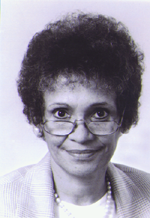1993 Frank Archibald Memorial Lecture
Aborigines and Universities: are they compatible?
The title of this lecture is "Universities and Aborigines: are they compatible?". I will be approaching this topic by providing you with an historical background to Aboriginal higher education; with some pertinent thoughts on this history from an Aboriginal perspective which is both critical and celebratory.
The Development of Aboriginal Higher Education
In 1972 the Australian Labor Party won federal office under the leadership of the Honourable Gough Whitlam. By this time it was obvious that Aborigines had successfully rejected assimilation into the wider Australian community. The new Prime Minister introduced the Self Determination Policy for Aborigines, and established the Department of Aboriginal Affairs (DAA) which led to the implementation of programs in education, health, legal aid, medical care and housing following consultation with Aboriginal people. This period also marked the evolution of Aboriginal higher education in Australia with the implementation of the Aboriginal Task Force program (ATF) in 1973 within the School of Social Studies, at the South Australian Institute for Technology, with the purpose of training a task force of Aborigines to work in the area of social welfare. Initially the intent was that the program should only operate for a two year period and then be abandoned. Because of the success of the first group of students, and the recommendation of an evaluation at the end of the first year, it was allowed to continue and develop providing the higher education sector with a blue print for what are now known as Aboriginal support programs.
Mary Ann Bin-Sallik
MEd, DEduc (Harv), AssocDipSocWork (SAIT), RN
 Mary Ann Bin-Sallik played a monumental role in the advancement of Aboriginal education.The proud Djaru Elder was born in Broome but spent her working life across Australia and the world. Challenging the expectation that as a young Indigenous woman she would become a domestic worker she began her training as a nurse at the age of 17 at Darwin Hospital.
Mary Ann Bin-Sallik played a monumental role in the advancement of Aboriginal education.The proud Djaru Elder was born in Broome but spent her working life across Australia and the world. Challenging the expectation that as a young Indigenous woman she would become a domestic worker she began her training as a nurse at the age of 17 at Darwin Hospital.
In 1975 she moved to South Australia where she completed an Associate Diploma in Social Work in 1979. In 1980-85 she was coordinator of the Aboriginal Taskforce at the South Australian Institute of Technology. 1985 saw her commence a Masters in Education at Harvard University in Boston, and in 1989 she completed her doctorate in education, also at Harvard.
On her return to Australia, Bin-Sallik was appointed Senior Lecturer in Aboriginal Studies at the South Australian College of Advanced Education. She became Head of the School of Aboriginal Studies and Teacher Education at the University of South Australia in 1990. Since then she has held a number of positions in education, including the Ranger Chair in Aboriginal Studies, Director of CINCRM and Dean of the Faculty of Aboriginal and Torres Strait Islander Studies at Northern Territory University. She was also Dean of the College of Indigenous Education and Research at the University of South Australia, and a Justice of the Peace.
Bin-Sallik served on numerous national and state committees, including the Commonwealth Government's Committee of Review of Aboriginal Employment and Training, the National Aboriginal Employment Development Committee and the National Committee Against Discrimination in Employment and Occupation. She was a member of the National Population Council, and the Council of the Institute of Aboriginal Studies (now AIATSIS) and a Co-Commissioner for the Human Rights Commissions' Enquiry into the Forced Removal of Aboriginal and Torres Strait Islander Children.
In 2000 Bin-Sallik edited and published her book, recording the lives and achievements of 13 Indigenous women. In 2017, Mary Ann Bin-Sallik was made an Officer in the General division of the Order of Australia 'for distinguished service to tertiary education as an academic, author and administrator, particularly in the area of Indigenous studies and culture, and as a role model and mentor.
Venue: Armidale Town Hall

